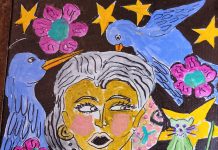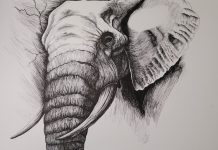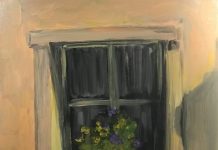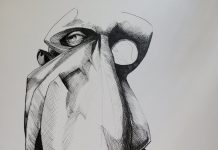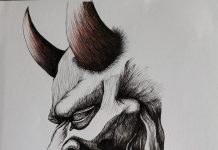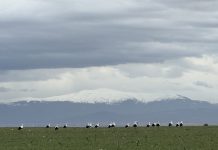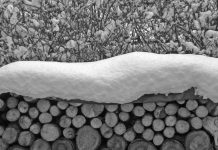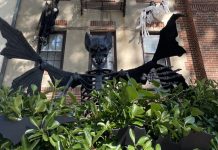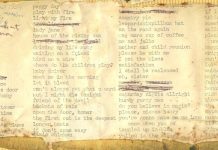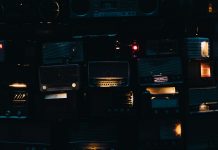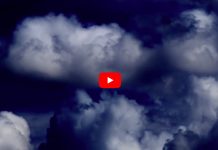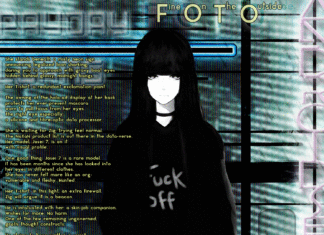He gave her a book that was navy blue and hardcover and had a strip of numbers taped on the spine.
“You’ll like it,” he said. “You’re like me.”
Jenna was sitting in bed reading when she saw him coming across the bridge. Her window overlooked a hill of trees that sloped to the canal. All the leaves were gone and she could see him marching near the railing. His collar was turned up and his coat tails furled as he battled a fierce wind.
“Didn’t you get cold walking across the canal?” she asked.
Bill stood perfectly straight on her front porch. Snow clung to the tops of his tall black boots. His green army jacket was wet across the shoulders.
“No,” he said. “I stop feeling things after a while.”
His face was red and his eyebrows looked icy. A green cloth cap was folded and wedged in his pocket.
“Do you want to come in?”
“No.” Bill rubbed his chapped hands. “I just wanted to give you this.”
He undid two shank buttons and pulled the book from his jacket. The cover felt warm from his chest.
“It’s a picture book,” he said. “By a war photographer. From the Great War.”
His gaze sharpened as she opened the book. The name of the library was stamped in three places and the circulation card was still in the pocket.
“Don’t worry about that.” He put his hands behind his back and rose onto his toes. “It’s OK.”
Jenna flipped through first few pages, running her fingertips over pictures of men wearing helmets and goggles and smoking. Planes soared from a flat ship while men in flared blue pants waved flags on a landing strip.
“They’re on an aircraft carrier,” he said. “Called the ‘Blue Ghost.’”
Bill’s breath formed tiny clouds in the air. He clicked his heels.
“How come you didn’t check this out?” Jenna asked.
Bill clenched a cigarette between his teeth. A flame arched from his silver lighter.
“Me and Dad can’t get library cards no more.”
“Well. I’ll get this back to you then,” she said. “I mean this looks like a valuable book.”
Bill smoothed his hair flat. His cheeks pulsed as he inhaled.
“No. You don’t have to,” he said. “It’s a gift. From me to you.”
His blue eyes softened like a boyfriend’s.
“OK then. We’ll talk about it later.”
He smiled and squared his shoulders.
“No one will miss it,” he said. “I blew the dust off when I pulled it from the shelf.”
Bill picked tobacco from his teeth and she saw his lip was split.
“You sure you’re not cold?”
“No. I told you,” he said. “I stop feeling things after a while.”
Jenna understood what he meant when she wedged the book inside her pea coat and walked across the bridge two days later. Sleet stung her cheeks so she buried her face in a scarf. Yellow streetlight spilled over the wake of a tugboat while a red sun tinted the rubble from the copper mines. Halfway across the bridge, she began practicing what she would say.
“You should take this back,” she mumbled. “It doesn’t belong to me.”
Jenna’s toes were numb by the time she reached the sandstone storefront. Bill lived upstairs and she could see steam escaping from a window propped open with a stick. The neon bar sign shouted into the twilight and made the snow sparkle on her suede boots. Taking a deep breath, she pulled on the heavy iron door and stepped onto the narrow stairs.
“You really should take this back,” she whispered to herself. Rapping the eagle knocker, she touched a chip of peeling paint, hearing it fall and break like china.
“It’s open.”
Bill’s voice boomed and she edged in, feeling the corners of the book pressing between her breasts. He emerged from his bedroom, dressed in green camouflage and a square canvas cap.
“Don’t mind him.”
Bill pointed toward the slippered feet jutting from a La-Z-Boy. His father was cradling a square bottle and snoring over the rat-a-tats on a tiny black-and-white TV. Pictures of ships and planes were tacked on the paneling behind him, hanging crooked in black metal frames.
“Nothing will wake him up,” Bill said. “Don’t worry.”
Jenna tiptoed by piles of empty tin cans and stacks of newspapers and into his room. His walls were covered with tacked-up declarations and triangular flags. A spiral notebook was on the floor next to a hardcover book with tiny type.
“What’d you think of The Blue Ghost?”
He slouched in a railed wooden chair and splayed his legs. A poster of Clint Eastwood wearing a bolero and draped in a Mexican blanket was right behind him. The Good, the Bad and the Ugly blasted through a portable stereo. Bill lit a cigarette and flicked ashes in a tin can. He rubbed the stubble of his beard.
“It was amazing,” she said. “The pictures, I mean.”
She unbuttoned her coat and pulled out the book. Bill looked away and yanked on his jackboots.
“I told you to keep it.” He turned up the volume on the stereo. “I’m serious.”
He slammed shots from a fifth then offered her a drink.
“Come on,” he said. “Take it.”
Jenna grabbed the bottle from his shaking hand.
“There you go,” he said. “Chug-a-lug.”
Jenna raised the bottle as his head bobbed and his eyes rolled back. As she drank, he started to snore, his rumbles overlapping the sound of his father’s in the other room.




